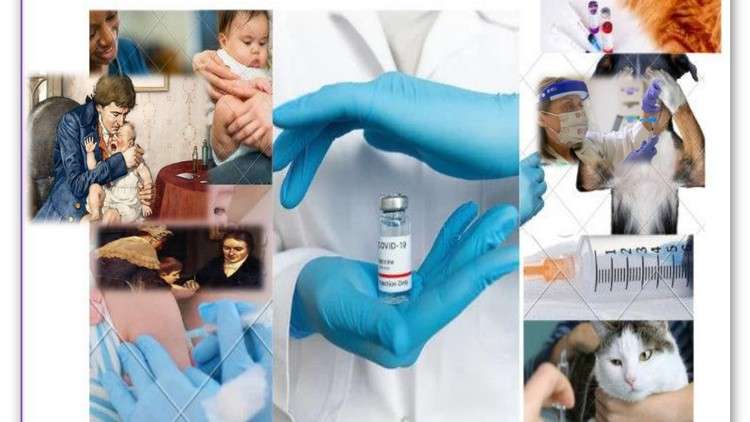
vaccine and vaccination
What you’ll be taught
vaccine historical past
kind of vaccine
vaccine schedule
vaccine manufacturing
Description
vaccine, suspension of weakened, killed, or fragmented microorganisms or toxins or different organic preparation, equivalent to these consisting of antibodies, lymphocytes, or messenger RNA (mRNA), that’s administered primarily to forestall illness.
human B cell
A vaccine can confer lively immunity in opposition to a selected dangerous agent by stimulating the immune system to assault the agent. As soon as stimulated by a vaccine, the antibody-producing cells, known as B cells (or B lymphocytes), stay sensitized and prepared to answer the agent ought to it ever acquire entry to the physique. A vaccine can also confer passive immunity by offering antibodies or lymphocytes already made by an animal or human donor. Vaccines are often administered by injection (parenteral administration), however some are given orally and even nasally (within the case of flu vaccine). Vaccines utilized to mucosal surfaces, equivalent to these lining the intestine or nasal passages, appear to stimulate a higher antibody response and could also be the simplest route of administration. (For additional data, see immunization.
the primary vaccines
Edward Jenner: smallpox vaccination
The primary vaccine was launched by British doctor Edward Jenner, who in 1796 used the cowpox virus (vaccinia) to confer safety in opposition to smallpox, a associated virus, in people. Previous to that use, nevertheless, the precept of vaccination was utilized by Asian physicians who gave kids dried crusts from the lesions of individuals affected by smallpox to guard in opposition to the illness. Whereas some developed immunity, others developed the illness. Jenner’s contribution was to make use of a substance much like, however safer than, smallpox to confer immunity. He thus exploited the comparatively uncommon scenario through which immunity to at least one virus confers safety in opposition to one other viral illness. In 1881 French microbiologist Louis Pasteur demonstrated immunization in opposition to anthrax by injecting sheep with a preparation containing attenuated types of the bacillus that causes the illness. 4 years later he developed a protecting suspension in opposition to rabies.
Vaccine effectiveness
historic mass vaccination applications in america
After Pasteur’s time, a widespread and intensive seek for new vaccines was performed, and vaccines in opposition to each micro organism and viruses have been produced, in addition to vaccines in opposition to venoms and different toxins. By means of vaccination, smallpox was eradicated worldwide by 1980, and polio instances declined by 99 %. Different examples of ailments for which vaccines have been developed embody mumps, measles, typhoid fever, cholera, plague, tuberculosis, tularemia, pneumococcal an infection, tetanus, influenza, yellow fever, hepatitis A, hepatitis B, some forms of encephalitis, and typhus—though a few of these vaccines are lower than one hundred pc efficient or are used solely in populations at excessive threat. Vaccines in opposition to viruses present particularly essential immune safety, since, not like bacterial infections, viral infections don’t reply to antibiotics
Vaccine varieties
How the polio vaccine modified the world
The problem in vaccine growth consists in devising a vaccine robust sufficient to thrust back an infection with out making the person severely in poor health. To that finish, researchers have devised several types of vaccines. Weakened, or attenuated, vaccines include microorganisms which have misplaced the power to trigger critical sickness however retain the power to stimulate immunity. They might produce a gentle or subclinical type of the illness. Attenuated vaccines embody these for measles, mumps, polio (the Sabin vaccine), rubella, and tuberculosis. Inactivated vaccines are people who include organisms which have been killed or inactivated with warmth or chemical compounds. Inactivated vaccines elicit an immune response, however the response usually is much less full than with attenuated vaccines. As a result of inactivated vaccines are usually not as efficient at preventing an infection as these constructed from attenuated microorganisms, higher portions of inactivated vaccines are administered. Vaccines in opposition to rabies, polio (the Salk vaccine), some types of influenza, and cholera are constructed from inactivated microorganisms. One other kind of vaccine is a subunit vaccine, which is constructed from proteins discovered on the floor of infectious brokers. Vaccines for influenza and hepatitis B are of that kind. When toxins, the metabolic by-products of infectious organisms, are inactivated to kind toxoids, they can be utilized to stimulate immunity in opposition to tetanus, diphtheria, and whooping cough (pertussis).
Find out how vaccines improve the human immune system to struggle in opposition to dangerous pathogens
historical past
within the late twentieth century, advances in laboratory methods allowed approaches to vaccine growth to be refined. Medical researchers might establish the genes of a pathogen (disease-causing microorganism) that encode the protein or proteins that stimulate the immune response to that organism. That allowed the immunity-stimulating proteins (known as antigens) to be mass-produced and utilized in vaccines. It additionally made it attainable to change pathogens genetically and produce weakened strains of viruses. In that method, dangerous proteins from pathogens might be deleted or modified, thus offering a safer and more-effective technique by which to fabricate attenuated vaccines.
Vaccinology is the science and engineering of growing vaccines to forestall infectious ailments.
Vaccines include antigens that stimulate the immune system to provide an immune response that’s usually much like that produced by the pure an infection. With vaccination, nevertheless, the recipient will not be subjected to the illness and its potential issues
Who invented vaccinology?
Dr Edward Jenner
Dr Edward Jenner created the world’s first profitable vaccine. He came upon that individuals contaminated with cowpox have been proof against smallpox. In Might 1796, English doctor Edward Jenner expands on this discovery and inoculates 8-year-old James Phipps with matter collected from a cowpox sore on the hand of a milkmaid
for hundreds of years, people have appeared for methods to guard one another in opposition to lethal ailments. From experiments and taking probabilities to a world vaccine roll-out within the midst of an unprecedented pandemic, immunization has a protracted historical past.
Vaccine analysis can elevate difficult moral questions, and a number of the experiments carried out for the event of vaccines prior to now wouldn’t be ethically acceptable at this time. Vaccines have saved extra human lives than every other medical invention in historical past.
Scroll on to take a journey by means of the final millennium to see how these extraordinary discoveries and achievements have modified our lives.
1400s to 1700s
From no less than the fifteenth century, individuals in several elements of the world have tried to forestall sickness by deliberately exposing wholesome individuals to smallpox– a observe generally known as variolation (after a reputation for smallpox, ‘la variola’). Some sources recommend these practices have been going down as early as 200 BCE.
in 1721, Girl Mary Wortley Montagu introduced smallpox inoculation to Europe, by asking that her two daughters be inoculated in opposition to smallpox as she had noticed observe in Turkey.
In 1774, Benjamin Jesty makes a breakthrough. Testing his speculation that an infection with cowpox – a bovine virus which might unfold to people – might defend an individual from smallpox
In Might 1796, English doctor Edward Jenner expands on this discovery and inoculates 8-year-old James Phipps with matter collected from a cowpox sore on the hand of a milkmaid. Regardless of struggling a neighborhood response and feeling unwell for a number of days, Phipps made a full restoration.
Two months later, in July 1796, Jenner inoculates Phipps with matter from a human smallpox sore as a way to check Phipps’ resistance. Phipps stays in good well being, and turns into the primary human to be vaccinated in opposition to smallpox. The time period ‘vaccine’ is later coined, taken from the Latin phrase for cow, vacca.
Learn extra in regards to the historical past of Smallpox vaccination.
The 1800s
In 1872, regardless of enduring a stroke and the dying of two of his daughters to typhoid, Louis Pasteur creates the primary laboratory-produced vaccine: the vaccine for fowl cholera in chickens.
In 1885, Louis Pasteur efficiently prevents rabies by means of post-exposure vaccination. The therapy is controversial. Pasteur has unsuccessfully tried to make use of the vaccine on people twice earlier than, and injecting a human with a illness agent continues to be a brand new and unsure technique.
Pasteur will not be a medical physician. However, regardless of the danger, he begins a course of 13 injections with affected person Joseph Meister, every containing a stronger dose of the rabies virus. Meister survives and later turns into the caretaker of Pasteur’s tomb in Paris.
In 1894, Dr Anna Wessels Williams isolates a pressure of the diphtheria micro organism that’s essential within the growth of an antitoxin for the illness.
novel vaccine
Recombinant DNA expertise has additionally confirmed helpful in growing vaccines to viruses that can not be grown efficiently or which are inherently harmful. Genetic materials that codes for a desired antigen is inserted into the attenuated kind of a giant virus, such because the vaccinia virus, which carries the international genes “piggyback.” The altered virus is injected into a person to stimulate antibody manufacturing to the international proteins and thus confer immunity. The strategy probably permits the vaccinia virus to perform as a dwell vaccine in opposition to a number of ailments, as soon as it has acquired genes derived from the related disease-causing microorganisms. The same process might be adopted utilizing a modified bacterium, equivalent to Salmonella typhimurium, because the service of a international gene.
Gardasil human papillomavirus vaccine
Vaccines in opposition to human papillomavirus (HPV) are constructed from virus like particles (VLPs), that are ready by way of recombinant expertise. The vaccines don’t include dwell HPV organic or genetic materials and subsequently are incapable of inflicting an infection. Two forms of HPV vaccines have been developed, together with a bivalent HPV vaccine, made utilizing VLPs of HPV varieties 16 and 18, and a tetravalent vaccine, made with VLPs of HPV varieties 6, 11, 16, and 18.
One other strategy, known as bare DNA remedy, includes injecting DNA that encodes a international protein into muscle cells. The cells produce the international antigen, which stimulates an immune response.
Vaccines primarily based on RNA have been of explicit curiosity as a way of stopping ailments equivalent to influenza, cytomegalovirus an infection, and rabies. Messenger RNA (mRNA) vaccines are advantageous as a result of the way in which through which they’re made permits them to be developed extra shortly than vaccines made by way of different strategies. As well as, their manufacturing might be standardized, enabling fast scale-up for the manufacture of enormous portions of vaccine. Novel mRNA vaccines are protected and efficient; they don’t include dwell virus, nor does the RNA work together with human DNA.
benefit and dis benefit
Advantages of vaccination
Discover out from Dr. Tina Tan of Northwestern College why grownup vaccination in opposition to numerous forms of ailments is essential
See all movies for this text
Along with the event of reminiscence B cells, that are able to triggering a secondary immune response upon publicity to the pathogen focused by a vaccine, vaccination can be helpful on the inhabitants degree. When a ample variety of people in a inhabitants are proof against a illness, as would happen if a big proportion of a inhabitants have been vaccinated, herd immunity is achieved. That implies that if there’s random mixing of people inside the inhabitants, then the pathogen can’t be unfold all through the inhabitants. Herd immunity acts by breaking the transmission of an infection or by lessening the possibilities of prone people coming involved with an individual who’s infectious. Herd immunity supplies a measure of safety to people who are usually not personally proof against the illness—as an example, people who, due to their age or underlying medical situations, can’t obtain vaccines or people who acquired vaccines however stay prone. Herd immunity performed an essential function within the profitable eradication of smallpox, and it’s important in stopping the unfold of ailments equivalent to polio and measles.
Hostile reactions
Vaccination carries some threat of response, although adversarial results sometimes are very uncommon and really delicate. The commonest reactions to vaccines embody redness and soreness across the vaccination website. Extra extreme adversarial reactions, equivalent to vomiting, excessive fever, seizure, mind injury, or dying, are attainable for some vaccines. Such reactions are exceptionally uncommon, nevertheless—occurring in lower than one in one million individuals for many vaccines. Extreme reactions additionally are inclined to have an effect on solely sure populations, equivalent to individuals whose immune techniques are compromised by preexisting illness (e.g., HIV/AIDS) or who’re present process chemotherapy.
Claims have been made that vaccines are liable for sure adversarial well being situations, notably autism, speech problems, and inflammatory bowel illness. A few of these claims centered on thimerosal, a mercury-containing compound used as a preservative in vaccines. Some individuals believed that autism was a type of mercury poisoning, triggered particularly by thimerosal in childhood vaccines. These claims have been discredited. Nonetheless, misinformation and concern generated by false claims about associations between autism and vaccines had a major affect on people’ perceptions about vaccine security. As well as, most people in nations the place vaccination is widespread have by no means personally skilled vaccine-preventable illness. Thus, the main focus of concern for some individuals shifted from the destructive results of vaccine-preventable illness to the attainable destructive results of the vaccines themselves.
Complacency about vaccine-preventable ailments, mixed with issues over the consequences of vaccination, led to lowering ranges of vaccination protection in some areas of the world. As a consequence, not solely have been people prone to vaccine-preventable ailments, however, at inhabitants ranges, vaccination charges dropped low sufficient to trigger losses of herd immunity, thereby permitting outbreaks of illness. Such outbreaks introduced excessive prices to societies, particularly by way of well being and medical care, incapacity and financial pressure, and lack of life. Within the twentieth century in Japan, England, and Russia, for instance, numbers of youngsters vaccinated in opposition to whooping cough dropped sufficiently low in order to allow outbreaks of illness that concerned 1000’s of youngsters and resulted in a whole bunch of deaths
Content material
Introduction
historical past of vaccines
Sorts of vaccines
immunology make distinction
immunodeficiency state
T cell function
reminiscence cells
herd immunity
prevention of illness
components have an effect on vaccine safety
vaccine schedules
vaccine security
way forward for vaccine
The publish All about vaccine and vaccnation appeared first on destinforeverything.com/cms.
Please Wait 10 Sec After Clicking the "Enroll For Free" button.








